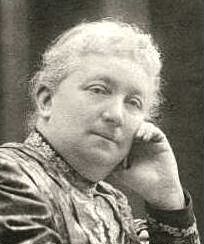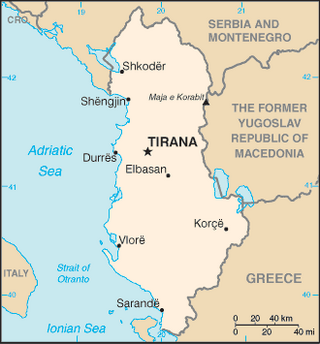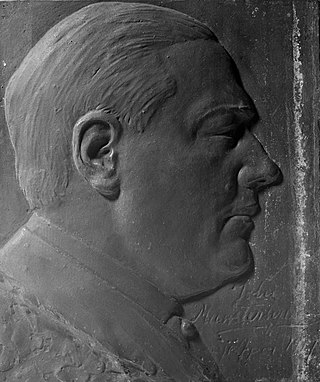Related Research Articles
Slavic or Slavonicstudies, also known as Slavistics, is the academic field of area studies concerned with Slavic peoples, languages, literature, history, and culture. Originally, a Slavist or Slavicist was primarily a linguist or philologist researching Slavistics. Increasingly, historians, social scientists, and other humanists who study Slavic cultures and societies have been included in this rubric.
Andrei Platonovich Platonov was a Soviet Russian novelist, short story writer, philosopher, playwright, and poet. Although Platonov regarded himself as a communist, his principal works remained unpublished in his lifetime because of their skeptical attitude toward collectivization of agriculture (1929–1940) and other Stalinist policies, as well as for their experimental, avant-garde form infused with existentialism. His famous works include the novels Chevengur (1928) and The Foundation Pit (1930).

PeterBerngardovich Struve was a Russian political economist, philosopher, historian and editor. He started his career as a Marxist, later became a liberal and after the Bolshevik Revolution, joined the White movement. From 1920, he lived in exile in Paris, where he was a prominent critic of Russian communism.

John Lane was a British publisher who co-founded The Bodley Head with Charles Elkin Mathews.

Gerald Ernest Heal Abraham, was an English musicologist, editor and music critic. He was particularly respected as an authority on Russian music.

Rosa Harriet Newmarch was an English poet and writer on music.
John Glad was an American academic who specialized in the literature and politics of exile, especially Russian literature. He also wrote about, and advocated for, eugenics.

This is a list of books in the English language which deal with Albania and its geography, history, inhabitants, culture, biota, etc.

Johan Hjalmar (John) Munsterhjelm was a Finnish sculptor.
Alexander Poznansky is a Russian-American scholar of the life and works of Pyotr Ilyich Tchaikovsky.
Anne Elizabeth Pennington (1934–1981) was a British philologist specialising in Slavic studies. She was particularly interested in songs as well as the development of the language.
Barbara Heldt is an American emerita professor of Russian at the University of British Columbia. The Heldt Prize, a literary award in her name, was established by the Association for Women in Slavic Studies. She was a member of the editorial board of the series Cambridge Studies in Russian Literature. She is best known for her researches on Russian literature by women, the introduction of gender analysis and feminist perspectives into Slavic studies, and for her translation of Karolina Pavlova's novel A Double Life.
This is a select bibliography of post-World War II English language books and journal articles about the Revolutionary and Civil War era of Russian (Soviet) history. The sections "General surveys" and "Biographies" contain books; other sections contain both books and journal articles. Book entries may have references to reviews published in English language academic journals or major newspapers when these could be considered helpful. Additional bibliographies can be found in many of the book-length works listed below; see Further reading for several book and chapter length bibliographies. The External links section contains entries for publicly available select bibliographies from universities.
This is a select bibliography of post-World War II English-language books and journal articles about Stalinism and the Stalinist era of Soviet history. Book entries have references to journal reviews about them when helpful and available. Additional bibliographies can be found in many of the book-length works listed below.
This is a select bibliography of English language books and journal articles about the post-Stalinist era of Soviet history. A brief selection of English translations of primary sources is included. The sections "General surveys" and "Biographies" contain books; other sections contain both books and journal articles. Book entries have references to journal articles and reviews about them when helpful. Additional bibliographies can be found in many of the book-length works listed below; see Further reading for several book and chapter-length bibliographies. The External links section contains entries for publicly available select bibliographies from universities.
Soul, or Dzhan is a novella by Andrey Platonov. It was completed in 1935 by as a result of his second trip to the Turkmen Republic. Although the Soviet state in the 1930s censored Dzhan, and only published selected chapters, the uncensored text was finally published in full in 1999.

Everyday Stalinism or Everyday Stalinism: Ordinary Life in Extraordinary Times: Soviet Russia in the 1930s is a book by Australian academic Sheila Fitzpatrick first published in 1999 by Oxford University Press and in paperback in 2000. Sheila Fitzpatrick is the Bernadotte E. Schmitt Distinguished Service Professor (Emeritus), Department of History, University of Chicago.
This is a select bibliography of post-World War II English language books and journal articles about the history of Russia and its empire from 1613 until 1917. It specifically excludes topics related to the Russian Revolution. Book entries may have references to reviews published in academic journals or major newspapers when these could be considered helpful.
Alan Timberlake is a linguist, a professor in the Department of Slavic Languages and Literatures at Columbia University and the director of the East Central European Center.
This is a select bibliography of English language books and journal articles about the history of Poland. A brief selection of English translations of primary sources is included. Book entries have references to journal articles and reviews about them when helpful. Additional bibliographies can be found in many of the book-length works listed below; see Further reading for several book and chapter-length bibliographies. The External links section contains entries for publicly available select bibliographies from universities and national libraries. This bibliography specifically excludes non-history related works and self-published books.
References
- 1 2 3 4 5 "Prof P R Bullock". Faculty of Medieval and Modern Languages. University of Oxford. Retrieved November 18, 2017.
- ↑ "Dr Philip Ross Bullock". Faculty of Music. University of Oxford. Retrieved November 19, 2017.
- ↑ "PHILIP ROSS BULLOCK: TORCH Director". The Oxford Research Centre in the Humanities. Retrieved November 18, 2017.
- 1 2 Pursglove, Michael (April 2006). "Reviewed Work: The Feminine in the Prose of Andrey Platonov by Philip Ross Bullock". The Slavonic and East European Review. 84 (2): 314–315. doi:10.1353/see.2006.0014. JSTOR 4214273.
- ↑ Seifrid, Thomas (Spring 2010). "Reviewed Work: The Feminine in the Prose of Andrey Platonov by Philip Ross Bullock". Slavic Review. 69 (1): 236–237. doi:10.1017/S0037677900017071. JSTOR 25621766. S2CID 165018700.
- ↑ Vernitski, Anat (July 2008). "Reviewed Work: The Feminine in the Prose of Andrey Platonov by Philip Bullock". Modern Language Review. 103 (3): 921–923. doi:10.2307/20468014. JSTOR 20468014.
- ↑ Naiman, Eric (October 2009). "Reviewed Work: The Feminine in the Prose of Andrey Platonov by Philip Bullock". The Russian Review. 68 (4): 693–694. JSTOR 20621122.
- 1 2 Carpenter, Ellon D. (January 2011). "Reviewed Work: Rosa Newmarch and Russian Music in Late Nineteenth and Early Twentieth-Century England. RMA Monographs, 18 by Philip Ross Bullock". The Russian Review. 70 (1): 138–139. JSTOR 41061801.
- ↑ Damaré, Brad Michael (Winter 2010). "Reviewed Work: Rosa Newmarch and Russian Music in Late Nineteenth and Early Twentieth-Century England. Royal Musical Association Monographs, No. 18 by Philip Ross Bullock". The Slavic and East European Journal. 54 (4): 732–733. JSTOR 23345072.
- ↑ Ross, Ryan (March 2013). "The Correspondence of Jean Sibelius and Rosa Newmarch, 1906–1939 ed. by Philip Ross (review)". Notes. 69 (3): 572–574. doi:10.1353/not.2013.0024. S2CID 161381433.
- ↑ Cross, Anthony (2014). "Book Review: Rebecca Beasley and Philip Ross Bullock (eds): Russia in Britain 1880–1940: From Melodrama to Modernism". Journal of European Studies. 44 (3): 312–315. doi:10.1177/0047244114541374u. S2CID 163580292.
- ↑ Frolova-Walker, Marina (2017). "Book Review: Philip Ross Bullock: Pyotr Tchaikovsky". Journal of European Studies. 47 (2): 219. doi:10.1177/0047244117705930p. S2CID 164452129.